Guide Details
 In
the early 2010s, hybrid meetings were hailed as the “breakout star” of the meeting and event industry, offering planners, sponsors, and venues incredible opportunities. With the successful execution of hybrid events, planners could expand
their audiences globally, introduce new and engaging formats, easily generate content for marketing and attendee on-demand experiences and give voice to those who might be reluctant, or unable, to attend in person.
In
the early 2010s, hybrid meetings were hailed as the “breakout star” of the meeting and event industry, offering planners, sponsors, and venues incredible opportunities. With the successful execution of hybrid events, planners could expand
their audiences globally, introduce new and engaging formats, easily generate content for marketing and attendee on-demand experiences and give voice to those who might be reluctant, or unable, to attend in person.
Early evangelists in the format successfully pushed the envelope of what was possible with the tools and suppliers available at the time. They learned hard-fought lessons about things like online streaming providers, bandwidth, latency, video, and audio
quality, and delivering engaging experiences to audiences that were not only not in the same ballroom but were connecting from offices, homes and mobile devices around the world.
Even so, an industry that prided itself on connecting in-person was skeptical of incorporating a digital audience. They worried about cost, complexity, technical failures, and despite research to the contrary, losing their in-person audiences. As a result,
online and hybrid events saw little innovation over the decade, and frequently amounted to little more than sticking a camera in the back of the room, broadcasting it to the Internet and calling it “hybrid.”
That all changed in 2020.
“Nowhere in the history of meetings have we seen such an explosion of so many different formats and applications of new technology,” wrote the authors of the original MPI Hybrid Meetings How-To Guide almost a decade earlier. If only they knew
what was to come! As the pandemic forced the meeting industry online, hundreds of companies created streaming platforms or pivoted from other event technology solutions. Planners were left to figure out how to translate and adapt their agendas, find
unique sponsorship and exhibitor opportunities and explore ways of engaging and keeping their online audiences engaged. They were thrown into a technological hurricane and given the choice to sink or swim.
Those who succeeded discovered what those early pioneers had already learned—adding online components to events expanded their audiences globally, introduced new and engaging formats, easily generated content for marketing and attendee on-demand
experiences and gave voice to those who might be reluctant, or unable, to attend in person. Sound familiar?
As the world opened up again, they naturally looked for ways to re-incorporate the in-person experience, and what was old became new again, as the hybrid event experience was reborn.
Introduction: History Informs the Future
Preparing for Your Hybrid Event
- What is (and Isn’t) a Hybrid Event?
- Types of Hybrid Audiences
- Starting with the Why
- Know Your Stakeholders
Designing Your Hybrid Experience
- Think Like a TV Producer
- The Hybrid Host
- Other Engagement Opportunities
- Presenters and Rehearsal
The Technology of Hybrid Events
- In-Room Audiovisual
- The Encoder, Venue ISP and Platform
- The Last Mile
- Vendor Support
- Technology Troubleshooting
Venues and Budgeting
- Choosing an Online Platform
- Budget Considerations
- Choosing Your In-Person Venues
Conclusions
Definitions

Author
Brandt Krueger is a technical producer, consultant and educator with more than 20 years’ experience in the meeting industry. He has spoken at events and conferences all over the world (in-person and remotely), been published in numerous magazines and web publications and is consistently ranked among the most influential people in the event industry. Find out more at www.Brandtkrueger.com
About Radisson Hotel Group
Radisson Hotel Group is one of the world’s largest hotel groups with nine distinctive hotel brands, and more than 1,500 hotels in operation and under development in 120 countries. The Group’s overarching brand promise is Every Moment Matters with a signature Yes, I Can! service ethos.
The Radisson Hotel Group portfolio includes Radisson Collection, Radisson Blu, Radisson, Radisson RED, Radisson Individuals, Park Plaza, Park Inn by Radisson, Country Inn & Suites by Radisson and prizeotel brought together under one commercial umbrella brand Radisson Hotels.
Radisson Meetings provides tailored solutions for any event or meeting, including hybrid solutions placing guests and their needs at the heart of its offer. Radisson Meetings is built around three strong service commitments: Personal, Professional and Memorable, while delivering on the brilliant basics and being uniquely 100% Carbon Neutral. For more information, visit radissonhotels.com.
